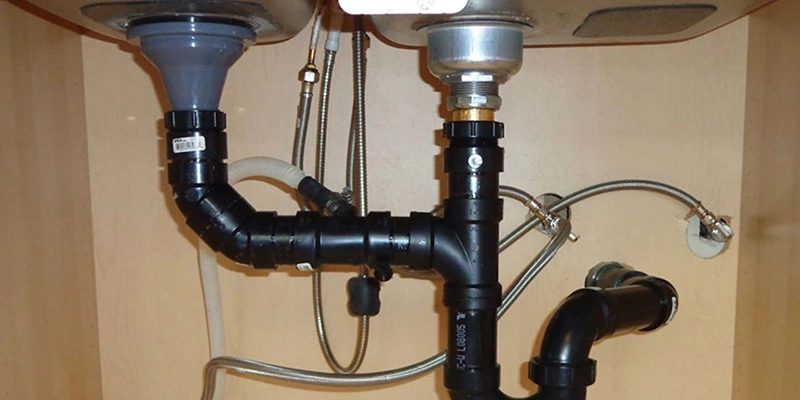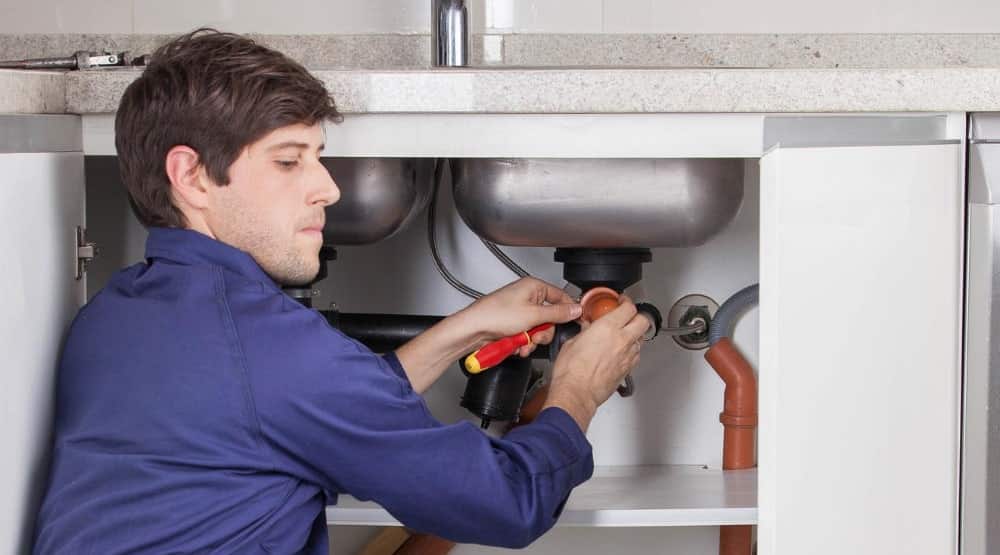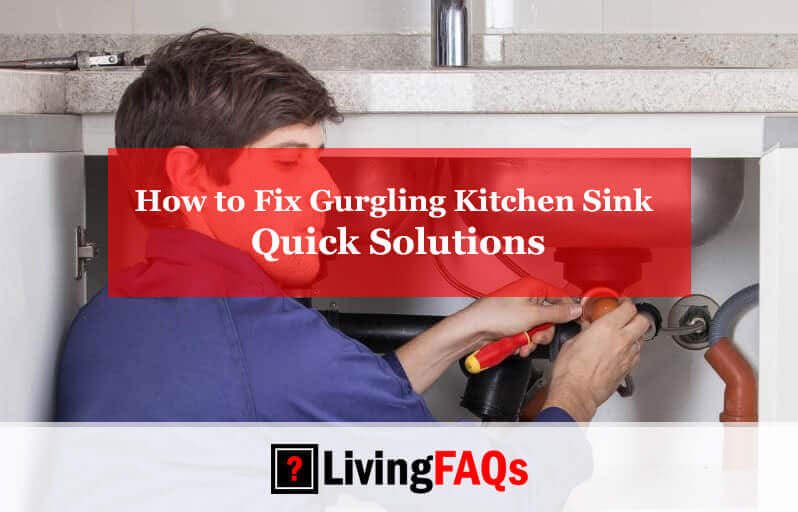To fix a gurgling kitchen sink, first check for clogs and clear them out. Ensure the vent pipe isn’t blocked for proper airflow.
A gurgling kitchen sink can be a sign of a blockage in your plumbing system. This annoying sound often indicates trapped air in the pipes, which is usually caused by a clog. Tackling this issue promptly can prevent bigger problems like complete blockages or water backing up.
Regular maintenance and quick responses to such plumbing noises can keep your kitchen functional and stress-free. Understanding the common causes behind this gurgling sound will equip you with the knowledge to address the problem efficiently. This article will guide you through simple troubleshooting techniques to diagnose and remedy the gurgling in your kitchen sink, ensuring your sink’s plumbing runs smoothly.
Identifying The Gurgling Sound
Is your kitchen sink making a gurgling noise? This sound can signal a plumbing issue. It usually occurs when water is draining. The gurgle may indicate a blockage or vent problem. Let’s diagnose the issue with the following steps.
Common Causes Of Gurgling
Blocked drain: Food scraps or grease can clog pipes. This causes water to drain slowly, creating gurgling sounds.
Air in the pipes: Air trapped in your plumbing can lead to gurgling. This happens when the water displaces the air.
Improper venting: Vents help maintain pressure balance in plumbing. Blocked vents can cause gurgling.
Blocked P-trap: The P-trap holds water to prevent sewer gases from entering the home. If blocked, it can gurgle.
When To Seek Professional Help
If simple fixes don’t work, call a plumber. Here are signs you need professional help:
- Persistent noise: Gurgle continues after trying DIY solutions.
- Slow drainage: Water takes longer to drain, indicating a deeper clog.
- Water backup: Water rises in the sink or other fixtures when using the sink.
- Bad smells: Foul odors could mean a serious blockage or vent issue.

Credit: m.youtube.com
Tools And Materials Needed
Before fixing a gurgling kitchen sink, gather the right tools and materials. This step is key. A proper toolkit makes the job easier and safer. Below, find the essentials for this task.
Basic Plumbing Toolkit
A well-equipped plumbing toolkit is crucial. Here are the must-haves:
- Plunger – Clears minor blockages.
- Pipe wrench – Helps tighten or loosen pipes.
- Adjustable wrench – For various nut and bolt sizes.
- Plumber’s tape – Seals pipe threads against leaks.
- Drain snake – Removes deeper clogs in pipes.
- Screwdriver set – Opens panels or tightens screws.
This toolkit addresses most plumbing issues, including gurgling sinks.
Safety Equipment
Protect yourself during repairs. Use the following safety gear:
- Gloves – Protect hands from sharp objects and chemicals.
- Goggles – Shield eyes from splashes and debris.
- Mask – Prevents inhaling harmful fumes.
With these tools and materials, you’re ready to tackle a gurgling kitchen sink.
Initial Checks And Preparations
Before tackling a gurgling kitchen sink, initial checks are vital. These simple steps help identify the problem. Let’s start with the basics. Preparations can prevent further issues.
Inspecting The Sink Area
First, assess the sink area. Look for obvious blockages. Check if the gurgling occurs when water drains. Make sure to note any abnormalities. This could include slow drainage or water backup.
Clearing Out Under The Sink
Next, clear the space under the sink. Remove cleaning supplies and stored items. This creates room to work. Have a bucket handy for any water spills. Keep towels nearby for quick cleanup. Ensure good lighting to see under the sink.
Diy Troubleshooting Techniques
Is your kitchen sink making gurgling noises? This issue can be annoying. But you can often fix it with simple DIY techniques. Below, we will explore some effective methods to solve this problem. Let’s dive into the DIY troubleshooting techniques to fix a gurgling kitchen sink.
Plunger Method
Using a plunger is a straightforward way to tackle a gurgling sink. Follow these steps:
- Fill the sink with enough water to cover the plunger’s cup.
- Place the plunger over the drain, ensuring a good seal.
- Push down and pull up the plunger rapidly.
- Repeat this several times to dislodge any blockage.
This method works well for minor clogs causing gurgling sounds.
Baking Soda And Vinegar Solution
This natural solution can effectively clear minor blockages. Here’s how:
- Pour half a cup of baking soda down the drain.
- Add a cup of vinegar slowly.
- Let the mixture sit for about 30 minutes.
- Flush the drain with hot water.
Repeat this process if necessary. The chemical reaction helps clear clogs and reduce gurgling noises.
By following these DIY techniques, you can often fix a gurgling kitchen sink. Simple tools and household items can solve common plumbing issues, saving you time and money.
Cleaning The P-trap
A gurgling kitchen sink can be annoying. One common fix involves cleaning the P-Trap. This U-shaped pipe under your sink collects debris. Over time, it can get clogged. Let’s clean it step by step.
Step-by-step P-trap Removal
- First, place a bucket under the P-Trap. This catches water and debris.
- Next, loosen the nuts holding the P-Trap. Use pliers if they’re tight.
- Carefully remove the P-Trap. Water and debris might spill out.
Cleaning And Reattaching The P-trap
- Rinse the P-Trap with water. Use a brush for stuck debris.
- Check for damage. Replace the P-Trap if it’s cracked.
- Reattach the P-Trap. Tighten the nuts by hand, then slightly with pliers.
- Run water to test. Listen for gurgles. No gurgles mean success!
Cleaning the P-Trap often solves the gurgle. It’s an easy DIY fix. Always wear gloves to protect your hands. Keep tools ready before you start. This makes the job smooth and quick.
Inspecting And Cleaning The Vent Pipe
Inspecting and Cleaning the Vent Pipe often resolves gurgling in kitchen sinks. A vent pipe balances air pressure within the drain system. Proper airflow ensures water and waste move smoothly without gurgling noises. A blocked vent can disrupt this balance and cause your sink to gurgle. Let’s identify and clear any vent obstructions to fix the issue.
Locating The Vent Pipe
Your home’s vent pipe is a crucial part of the plumbing system. It usually extends through the roof. Look for a pipe that sticks out of the roof, typically above the kitchen. In some homes, the vent may be located on the side of the house. Ensure you identify the right pipe before proceeding.
Clearing Obstructions In The Vent
Once located, check the vent for any obstructions. Common blockages include leaves, nests, or debris. Wear gloves and use a flashlight to inspect the vent opening. For safety, do this from the ground or securely use a ladder. Remove visible debris by hand.
- Use a plumber’s snake to clear deeper clogs.
- Run water through the vent to ensure it is clear.
- Listen for the absence of gurgling sounds.
If the vent is high or the blockage severe, consider hiring a professional. Regular maintenance prevents future sink gurgling. Keep your kitchen sink running smoothly by checking and cleaning the vent pipe annually.
Using A Plumber’s Snake
A plumber’s snake is an effective tool for clearing clogs causing a gurgling kitchen sink. It is a flexible auger that can reach deep into the pipes to dislodge the blockage.
Guidelines For Effective Use
- Feed the plumber’s snake into the drain until you feel resistance.
- Rotate the snake handle clockwise to break up the clog.
- Slowly pull the snake back out to remove the dislodged debris.
Precautions To Avoid Damage
- Avoid using excessive force to prevent pipe damage.
- Do not push the snake too far to prevent tangling in the pipes.
- Wear gloves and eye protection while operating the plumber’s snake.

Credit: hawthornephc.com
Long-term Maintenance Tips
Long-Term Maintenance Tips keep your kitchen sink working well. Follow these steps and avoid gurgling sounds for good.
Regular Cleaning Routines
Keeping a sink clean prevents build-up. Dirt and grease can cause gurgling.
- Weekly hot water flushes: Pour boiling water down the drain.
- Use natural cleaners: Baking soda and vinegar work wonders.
- Brush the drain: A stiff brush can clear out debris.
Preventing Future Clogs
Stop clogs before they start. A clog-free sink won’t gurgle.
- Install strainers: Catch food scraps and other solids.
- Avoid grease: Don’t pour oils down the sink.
- Run cold water with disposals: This solidifies fats for easy grinding.
Follow these tips for a quiet, efficient sink.
When To Replace Plumbing Components
A gurgling kitchen sink can signal the need for plumbing maintenance. Knowing when to replace components is crucial. Avoid costly repairs by spotting issues early. Let’s explore the signs that suggest a replacement is due.
Signs Of Worn Out Parts
Several indicators suggest your sink’s plumbing might need attention:
- Persistent gurgling noises after water drains
- Water draining slowly, indicating possible blockages
- Unpleasant odors that persist even after cleaning
- Leaks under the sink or in the cabinet
- Visible corrosion on pipes or fittings
These signs point to worn parts. They should prompt immediate action to prevent damage.
Choosing The Right Replacements
Selecting the right parts ensures longevity and proper function. Follow these steps:
- Identify the affected component. Check the sink’s trap, drainpipe, or vent.
- Choose quality materials. PVC pipes and stainless steel fittings are durable options.
- Consider compatibility with your existing setup. Sizes and connections must match.
- Look for eco-friendly options. They save water and reduce bills.
Right replacements keep your sink running smoothly. They prevent future problems.

Credit: mytrustedexpert.com
Conclusion: Ensuring A Quiet Sink
A quiet kitchen sink is a happy kitchen sink. We all want that. Let’s make sure our sink stays silent and happy.
Review Of Key Steps
- Check for clogs and clear them.
- Inspect the vent pipe; it should be clear.
- Ensure water flows freely, without any blockages.
- Use a plumber’s snake if needed, to clear deep clogs.
- Regularly clean the sink to prevent buildup.
Benefits Of Regular Upkeep
| Benefit | Description |
|---|---|
| Less Noise | A clean sink prevents gurgling and ensures quiet. |
| Prevents Clogs | Regular cleaning keeps the pipes clear. |
| Better Drainage | Water flows smoothly, without any hindrance. |
| Longer Lifespan | Upkeep prevents wear and tear, extending the sink’s life. |
Remember, a little care goes a long way. Keep your sink clean and enjoy the silence.
Frequently Asked Questions
Why Does My Kitchen Sink Gurgle?
A gurgling kitchen sink often indicates a venting or blockage issue in the drain pipes, requiring aeration or cleaning to resolve.
Can A Clogged Vent Cause Sink Gurgling?
Yes, a clogged vent can restrict airflow, leading to pressure changes and the characteristic gurgling noise in your sink.
How To Stop Sink Gurgling?
Clearing the blockage, checking vent pipes, and ensuring proper P-trap water levels can effectively stop your sink from gurgling.
Will Vinegar And Baking Soda Fix A Gurgling Sink?
Vinegar and baking soda can break down minor blockages, which might stop the gurgling if a clog is the cause.
Is Gurgling A Sign Of A Serious Plumbing Issue?
Gurgling can signal potential plumbing problems. If simple fixes don’t work, it’s wise to consult a professional plumber.
Conclusion
Fixing a gurgling kitchen sink is simpler than you might think. With the right tools and a bit of patience, most issues can be resolved. Remember, regular maintenance can prevent future gurgles. Don’t let a noisy sink disrupt your home’s harmony.
Give these tips a try and enjoy the sound of silence once again.

